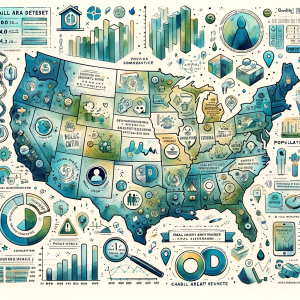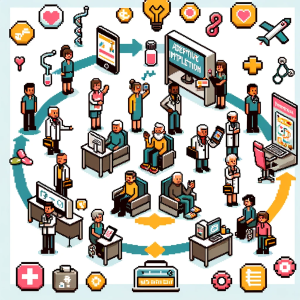
Training the Next Generation of Public Health Data Scientists in Africa
Imagine a future where robust, real-time data power public health decisions in Africa. Where malaria outbreaks are predicted and contained early, maternal health interventions are tailored to specific regions, and health policies are crafted based on solid evidence. This isn’t a distant dream—it’s the vision driving the Advancing Public Health Research in Eastern Africa through Data Science Training (APHREA-DST) initiative.
In a region where public health challenges like malaria, HIV/AIDS, and COVID-19 cast long shadows, the potential for data science to revolutionize healthcare is immense. Yet, a severe shortage of well-trained data scientists and tailored educational programs has left this potential largely untapped—until now.
A Bold Collaboration Across Continents
The APHREA-DST initiative is a collaborative effort between Columbia University (USA), Addis Ababa University (Ethiopia), and the University of Nairobi (Kenya). Together, these institutions are addressing a critical need: building a new generation of public health data scientists who can analyze complex datasets and translate them into actionable insights.
This program isn’t just about teaching data science—it’s about embedding it into the fabric of public health practice. By developing context-specific master’s programs in Public Health Data Science (PHDS), APHREA-DST is laying the groundwork for sustainable capacity building across Africa. These programs emphasize not only technical skills like machine learning and big data analytics but also the ethical and practical nuances of applying these tools to real-world health challenges.
Why Data Science Matters for Public Health in Africa
The rise of data science has transformed industries worldwide, but its application in African public health is particularly urgent. Sub-Saharan Africa faces a dual challenge: a high disease burden and limited resources for managing public health crises. Data science offers a way to maximize the impact of those resources.
Consider this: Health Information Systems (HIS) in many African countries already collect vast amounts of data. But without skilled analysts, this data often remains underutilized. APHREA-DST is changing that narrative by training data scientists to harness these datasets for life-saving interventions. For example:
- Predictive analytics can forecast disease outbreaks, enabling proactive measures.
- Health surveillance data can identify trends in maternal and child health, guiding targeted interventions.
- Data visualization tools can communicate complex findings to policymakers, ensuring evidence-based decisions.
Building the Blueprint for Success: Curriculum Development and Stakeholder Engagement
One of APHREA-DST’s standout achievements is the creation of master’s degree programs at Addis Ababa University and the University of Nairobi. These programs, launched in 2023, are grounded in stakeholder input. Local public health practitioners, government agencies, and academic experts all contributed to shaping a curriculum that reflects the region’s unique needs.
The curriculum balances foundational data science topics—like statistics and machine learning—with public health applications. Students learn to analyze health data, predict disease trends, and design interventions tailored to their communities. Importantly, ethical considerations are woven throughout, ensuring graduates are equipped to navigate the complexities of health data.
To support this effort, the program also includes a faculty mentoring initiative. Experienced professors from Columbia University collaborate with faculty in Ethiopia and Kenya, building local capacity to sustain these programs long after external funding ends.
Overcoming Challenges, Seizing Opportunities
Implementing a project of this magnitude hasn’t been without hurdles. From navigating bureaucratic curriculum approvals to aligning different regulatory requirements, the team has had to adapt and persevere. Yet, these challenges have underscored the importance of early and ongoing stakeholder engagement.
On the flip side, APHREA-DST has also uncovered a wealth of opportunities. Governments in both Ethiopia and Kenya are increasingly committed to leveraging health data, creating fertile ground for the program’s success. Partnerships with organizations like the GEOHealth Hub and the African Engineering and Technology Network (Afretec) are providing access to valuable data and expertise.
The Ripple Effect: Long-Term Impacts
The impact of APHREA-DST extends beyond individual graduates. By training public health data scientists, the program is creating a ripple effect that will benefit entire health systems. Graduates are already applying their skills to projects like disease surveillance and health system monitoring, improving outcomes for their communities.
Additionally, the initiative is fostering a culture of collaboration and innovation. Research groups in Ethiopia and Kenya are working on cutting-edge projects in areas like environmental health and infectious disease modeling. These groups are not only advancing public health research but also building networks of expertise that will drive progress for years to come.
What’s Next?
As APHREA-DST enters its next phase, sustainability is a top priority. Plans are underway to expand the program to other East African countries, ensuring its benefits reach even more communities. The team is also exploring ways to integrate data science into PhD curricula, creating a pipeline of experts who can lead future innovations.
But challenges remain. Scaling the program will require continued investment, both financial and institutional. Data-sharing agreements and regulatory compliance will need careful attention. And bridging gender gaps—such as the underrepresentation of women in data science—will require deliberate efforts.
Join the Conversation
How can initiatives like APHREA-DST inspire similar efforts in other regions facing health challenges? What role can global partnerships play in building sustainable solutions for public health? And how can we ensure that data-informed approaches are both ethical and equitable?
We’d love to hear your thoughts—share your ideas in the comments or join the conversation on social media. Together, we can explore how data science can transform public health, one dataset at a time.
Don’t Miss Out – Subscribe Now!
Public health needs your voice today. Join thousands of leaders already making a difference. Subscribe for free to This Week in Public Health and receive weekly updates packed with tools to drive change.
🚨 Urgency matters—take action now and share this blog to expand our reach!



